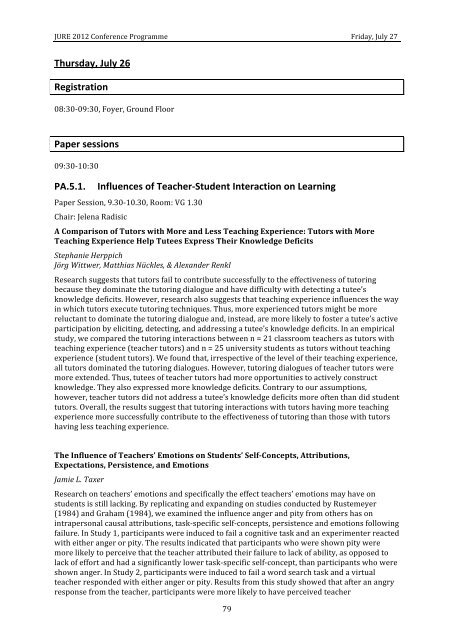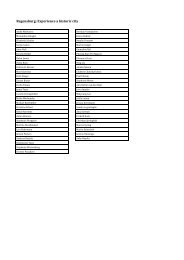JURE 2012 Programme book - EARLI Jure 2012
JURE 2012 Programme book - EARLI Jure 2012
JURE 2012 Programme book - EARLI Jure 2012
Create successful ePaper yourself
Turn your PDF publications into a flip-book with our unique Google optimized e-Paper software.
<strong>JURE</strong> <strong>2012</strong> Conference <strong>Programme</strong> Friday, July 27<br />
Thursday, July 26<br />
Registration<br />
08:30-‐09:30, Foyer, Ground Floor<br />
Paper sessions<br />
09:30-‐10:30<br />
PA.5.1. Influences of Teacher-‐Student Interaction on Learning<br />
Paper Session, 9.30-‐10.30, Room: VG 1.30<br />
Chair: Jelena Radisic<br />
A Comparison of Tutors with More and Less Teaching Experience: Tutors with More<br />
Teaching Experience Help Tutees Express Their Knowledge Deficits<br />
Stephanie Herppich<br />
Jörg Wittwer, Matthias Nückles, & Alexander Renkl<br />
Research suggests that tutors fail to contribute successfully to the effectiveness of tutoring<br />
because they dominate the tutoring dialogue and have difficulty with detecting a tutee’s<br />
knowledge deficits. However, research also suggests that teaching experience influences the way<br />
in which tutors execute tutoring techniques. Thus, more experienced tutors might be more<br />
reluctant to dominate the tutoring dialogue and, instead, are more likely to foster a tutee’s active<br />
participation by eliciting, detecting, and addressing a tutee’s knowledge deficits. In an empirical<br />
study, we compared the tutoring interactions between n = 21 classroom teachers as tutors with<br />
teaching experience (teacher tutors) and n = 25 university students as tutors without teaching<br />
experience (student tutors). We found that, irrespective of the level of their teaching experience,<br />
all tutors dominated the tutoring dialogues. However, tutoring dialogues of teacher tutors were<br />
more extended. Thus, tutees of teacher tutors had more opportunities to actively construct<br />
knowledge. They also expressed more knowledge deficits. Contrary to our assumptions,<br />
however, teacher tutors did not address a tutee’s knowledge deficits more often than did student<br />
tutors. Overall, the results suggest that tutoring interactions with tutors having more teaching<br />
experience more successfully contribute to the effectiveness of tutoring than those with tutors<br />
having less teaching experience.<br />
The Influence of Teachers’ Emotions on Students’ Self-‐Concepts, Attributions,<br />
Expectations, Persistence, and Emotions<br />
Jamie L. Taxer<br />
Research on teachers’ emotions and specifically the effect teachers’ emotions may have on<br />
students is still lacking. By replicating and expanding on studies conducted by Rustemeyer<br />
(1984) and Graham (1984), we examined the influence anger and pity from others has on<br />
intrapersonal causal attributions, task-‐specific self-‐concepts, persistence and emotions following<br />
failure. In Study 1, participants were induced to fail a cognitive task and an experimenter reacted<br />
with either anger or pity. The results indicated that participants who were shown pity were<br />
more likely to perceive that the teacher attributed their failure to lack of ability, as opposed to<br />
lack of effort and had a significantly lower task-‐specific self-‐concept, than participants who were<br />
shown anger. In Study 2, participants were induced to fail a word search task and a virtual<br />
teacher responded with either anger or pity. Results from this study showed that after an angry<br />
response from the teacher, participants were more likely to have perceived teacher<br />
79



